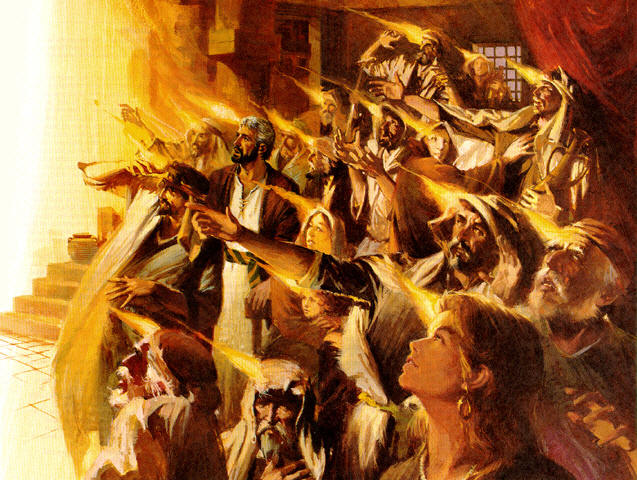
An Epiphany: Part One
There are three passages in the Old Testament (Gen. 19: 1-13; Lev 18:22; 20:13) and three in the New Testament (Rom. 1:26-27; 1 Corinthians 6:9-10; I Tim. 1:10) that have traditionally been read as condemning homosexuality. For many years I have taken these Scriptures and put them in a place of greater importance than others, and I repent of that sin.
The Biblical definition of “sin” is “missing the mark” (hamartia), and on the basis of this scriptural evidence. I have to regard homosexuality as “missing the mark” of God’s ideal. So yes, I still regard homosexuality to be a sin.
Having said this, I must also reveal an epiphany. I think there are other sins that do much more harm in the world. Good people have wrongly put way too much emphasis on this sin. And I believe that there is evil behind that emphasis. Satan has used this huge emphasis to divide the Body of Christ.
I see it as a sin among many others, not the red letter sin above all others that some have wrongly (by Biblical standards) that some have made it out to be.
If you study what the Bible has to say about sin, there is absolutely no justification for the way many Christians today make homosexuality out to be worse than other types of sin. Some Christian leaders have crusaded in huge ways against homosexuality and have made people to think it was the number one sin in the Bible and the most damaging sin to society. But that is NOT the Biblical record.
Yet, we have at most six verses in the Bible that mention homosexuality, and we have around 3,000 passages that address greed, gluttony and the need to care for the poor. Not only this, but if there are any sins American Christians are most guilty of, they’re greed, gluttony and apathy toward the poor. And if there are any sins that demonstrably kill people, it’s these ones.
Yet Christians go after gays. Why? Does it make us feel self-righteous in condemning others. What did Jesus say about judging others?
Luke 6:37-42 [37] "Do not judge, and you will not be judged. Do not condemn, and you will not be condemned. Forgive, and you will be forgiven. [38] Give, and it will be given to you. A good measure, pressed down, shaken together and running over, will be poured into your lap. For with the measure you use, it will be measured to you." [39] He also told them this parable: "Can a blind man lead a blind man? Will they not both fall into a pit? [40] A student is not above his teacher, but everyone who is fully trained will be like his teacher. [41] "Why do you look at the speck of sawdust in your brother's eye and pay no attention to the plank in your own eye? [42] How can you say to your brother, `Brother, let me take the speck out of your eye,' when you yourself fail to see the plank in your own eye? You hypocrite, first take the plank out of your eye, and then you will see clearly to remove the speck from your brother's eye.
When you look at the big picture of the problem of sin in the world, there’s no justification for the way many Christians make homosexuality a “deal breaker” sin. Here is a good question -- is it possible to be a Christian and also be gay?
You can be Christian and be greedy, an overeater, a gossiper, a person who holds a grudge, and who never sacrifices for the poor, but you can’t be gay? You can be Christian and be divorced and remarried, gossip and judge others — all mentioned in the Bible more than homosexuality — but you can’t be gay? Why?
When I attended the General Assembly in Minneapolis, where I actively campaigned and voted against Amendment 10A, which eventually was approved and now allows gay ordination, I had a number of interesting discussions with people with different views on the subject, and I picked up every piece of literature I could that was written by theologians with other ideas than my own.
The most prevalent argument I heard was that Jesus never said anything about homosexuality in the Gospels. That is an amazing thing to consider, isn't it? One conservative friend said, "It does not matter what Jesus said or didn't say!" Then he caught himself and grew very quiet.
One argument that I thought had some strength was that Leviticus, usually the first passage quoted by Christians against homosexuality, had rules and laws that were definitely particular to that time. Leviticus, in the Hebrew Scriptures, condemns homosexual behavior, at least for males. Yet, "abomination", the word Leviticus uses to describe homosexuality, is the same word used to describe a menstruating woman. And a deeper study of the word translated abomination shows many other things that are called just that by the Scriptures.
Certainly, there are are a number of scholars who argue that these six passages are not as clear cut in denouncing all forms of homosexuality as they may initially seem.
For example, some point out that the word Paul uses in I Tim. 6 and I Tim. 1 that is usually translated as “homosexuality” (arsenakoitai) is very ambiguous. It’s never used before Paul coins it in these verses and historically it’s been translated in a wide variety of ways. (For example, Luther translated it “masturbation”).
Some scholars argue that the kind of homosexuality Paul had in mind when writing Romans 1 would have been the kind typically practiced by Romans and would not have included loving, respectful, monogamous committed relationships. I am not convinced by these arguments, but this academic debate is ongoing.
I have attended a number of gatherings where the "sanctity of marriage" has been proclaimed as under attack in Iowa by the Supreme Court decision to allow same sex marriages as a civil rights protection under the constitution. I, like many good people who attended these gatherings, have always felt that the entire biblical narrative presupposes that sex is supposed to take place between a man and a woman in the context of marriage (Gen. 2:23-24).
Of course, there are substantial wanderings from this one man, one woman idea in the lives of some prominent Biblical figures, such as David and Solomon. If one man, one woman is the mark, as I have always felt that it is, then you have to admit that David, the man after God's own heart, lived in sin, and so did the wisest man on earth, his son with Bathsheeba, the great King Solomon.
The great truth that comes out of reflection on these Biblical facts with David and Solomon is that even though they missed it in "traditional" marriage fidelity, God still used them in His ministry to the Hebrew people. They too lived in a broken sinful world and were sinners themselves, and yet they were used in mighty ways by God for God's purposes.
And if you use the "well it was culturally what they did in those days card," which has historical truth, you open yourself up to the application of that idea in myriad situations in the Bible. But, however you explain it, if one man. one woman is the Biblical narrative and Godly norm, then David and Solomon and others missed the mark in their married life. They sinned extravagantly.
Other sins that they did -- like David arranging for Bathsheeba's husband to die on the battlefield, and Solomon allowing his many wives to have shrines to other gods, are pointed out and punished in the Bible. But there is no clear, direct punishment for their multiple marriages sins. Curious, isn't it?
I agree with Dr. Greg Boyd, who writes, "When people get their life from their religion rather than from their relationship with Christ, they need to find some sin-group they can positively contrast themselves with. Sadly, for many Christians, this happens to be gay people."
This tendency to put sins on a scale of importance, ranking homosexuality near the top and other sins – the ones we are guilty of (and that are mentioned more frequently in the Bible) – towards the bottom does not fit with the ethics of the Kingdom.
Jesus commands us to do the opposite. We’re to regard our sins, whatever they are, as planks sticking out of our eyes, and other peoples sins, whatever they are, to be mere dust particles (Mt. 7:1-3). With Paul, we are to confess that we are “the worst of sinners” (I Tim. 1:15-16).
So, while I still believe homosexuality “misses the mark,” as we all do in some ways in our lives, either with sins of commission or sins of omission, I have come to believe through a deep study of the Scriptures that it doesn’t do so more than any other sin we might think of — including the ones we are guilty of committing.
Epiphany, Part One of Six, S. Glenn Wilson, 2011
Epiphany, Part One of Six, S. Glenn Wilson, 2011















